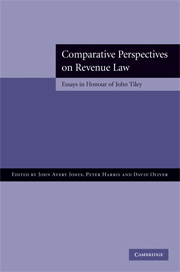Book contents
- Frontmatter
- Contents
- Contributors and affiliations
- Foreword by Dave Hartnett
- Foreword by Hugh Ault
- 1 A comparison of statutory general anti-avoidance rules and judicial general anti-avoidance doctrines as a means of controlling tax avoidance: Which is better? (What would John Tiley think?)
- 2 The judicial approach to avoidance: some reflections on BMBF and SPI
- 3 Comparing the application of judicial interpretative doctrines to revenue statutes on opposite sides of the pond
- 4 Abuse of rights and European tax law
- 5 The US legislative and regulatory approach to tax avoidance
- 6 The law of taxation and unjust enrichment
- 7 The history of royalties in tax treaties 1921–61: Why?
- 8 Land taxation, economy and society in Britain and its colonies
- 9 Meade and inheritance tax
- 10 Taxation, human rights and the family
- 11 Family connections and the corporate entity: income splitting through the family company
- Epilogue: Establishing the foundations of tax law in UK universities
- References
- Table of cases
- Table of abbreviations
- Index
4 - Abuse of rights and European tax law
Published online by Cambridge University Press: 07 December 2009
- Frontmatter
- Contents
- Contributors and affiliations
- Foreword by Dave Hartnett
- Foreword by Hugh Ault
- 1 A comparison of statutory general anti-avoidance rules and judicial general anti-avoidance doctrines as a means of controlling tax avoidance: Which is better? (What would John Tiley think?)
- 2 The judicial approach to avoidance: some reflections on BMBF and SPI
- 3 Comparing the application of judicial interpretative doctrines to revenue statutes on opposite sides of the pond
- 4 Abuse of rights and European tax law
- 5 The US legislative and regulatory approach to tax avoidance
- 6 The law of taxation and unjust enrichment
- 7 The history of royalties in tax treaties 1921–61: Why?
- 8 Land taxation, economy and society in Britain and its colonies
- 9 Meade and inheritance tax
- 10 Taxation, human rights and the family
- 11 Family connections and the corporate entity: income splitting through the family company
- Epilogue: Establishing the foundations of tax law in UK universities
- References
- Table of cases
- Table of abbreviations
- Index
Summary
Introduction
The author's personal relationship with John Tiley begins with the reading of his writings on tax avoidance some twenty years ago. Having returned to Germany from a three-month stint with City law firm Herbert Smith, I felt the necessity to keep my knowledge of UK law (and – even more important for a continental lawyer – of English legal terminology) updated. Respectfully, I resorted to the British Tax Review and the first piece I ever read in this prestigious journal was Tiley's masterly analysis of common law cases on tax avoidance. I got stuck with the writer and his topic (and the journal) immediately and followed his work (at least insofar as it was published in sources available on the other side of the Channel) during the following years. The first time I started to build my own thoughts on these writings occurred in 1995, when I gave a lecture on tax avoidance and EC law at Bonn University which ventured to set out a common understanding of tax avoidance both from a comparative view of Member States' legal approaches to tax planning and from an autonomous interpretation of EC law. Seven years later, I added a second piece to this mosaic which dealt with the concept of abuse in the ECJ's company law cases. Unfortunately, these presentations were not published in English.
- Type
- Chapter
- Information
- Comparative Perspectives on Revenue LawEssays in Honour of John Tiley, pp. 75 - 98Publisher: Cambridge University PressPrint publication year: 2008
- 2
- Cited by

